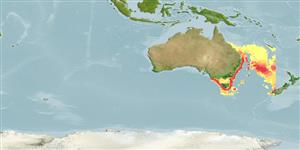Environment: milieu / climate zone / depth range / distribution range
Ökologie
seewasser; süßwasser; brackwasser benthopelagisch; katadrom (Ref. 9258); tiefenbereich 0 - 3000 m (Ref. 86942). Subtropical; 18°S - 47°S, 140°E - 168°E
Southwest Pacific: east coast of Australia and New Zealand, extending north to New Caledonia. Museum records from Fiji and Tahiti are doubtful. Australian and New Zealand forms sometimes recognized as subspecies. Most easily confused with Anguilla obscura and the surest way of distinguishing them is to count the vertebrae. Reported from Western and American Samoa (Ref. 592).
Size / Gewicht / Alter
Maturity: Lm ? range ? - ? cm
Max length : 130 cm TL Männchen/unbestimmt; (Ref. 40637); 106.5 cm TL (female); common length : 45.0 cm TL Männchen/unbestimmt; (Ref. 9258); common length :65 cm TL (female); max. veröff. Gewicht: 7.5 kg (Ref. 40637); max. veröff. Alter: 32 Jahre (Ref. 6390)
Occurs in streams, lakes and swamps. More likely inhabits slow flowing streams or still waters (Ref. 26509). Feeds on fishes, crustaceans, mollusks, worms, aquatic plants, and terrestrial and aquatic insects. This species does not breed outside its Pacific spawning ground. Migrates to the sea to breed (Ref. 9258). Maximum length for female eel taken from Ref. 6390. Migrating females in Lake Ellesmere (Canterbury, New Zealand) were reported to be in the range of 48.3 to 102.4 cm, larger than for males 33.8 to 55.4 cm (Ref. 44724). Despite its slimy appearance, its flesh is of excellent quality, considered a delicacy in many countries; meat suitable for smoking (Ref. 33839).
Allen, G.R., 1989. Freshwater fishes of Australia. T.F.H. Publications, Inc., Neptune City, New Jersey. (Ref. 5259)
IUCN Rote Liste Status (Ref. 130435: Version 2024-2)
Bedrohung für Menschen
Harmless
Nutzung durch Menschen
Fischereien: kommerziell; Aquakultur: kommerziell; Sportfisch: ja
Tools
Zusatzinformationen
Download XML
Internet Quellen
Estimates based on models
Preferred temperature (Ref.
123201): 4.3 - 9.1, mean 5.3 °C (based on 57 cells).
Phylogenetic diversity index (Ref.
82804): PD
50 = 0.5000 [Uniqueness, from 0.5 = low to 2.0 = high].
Bayesian length-weight: a=0.00068 (0.00054 - 0.00085), b=3.16 (3.11 - 3.21), in cm total length, based on LWR estimates for this species (Ref.
93245).
Trophic level (Ref.
69278): 4.3 ±0.5 se; based on diet studies.
Widerstandsfähigkeit (Ref.
120179): niedrig, Verdopplung der Population dauert 4,5 - 14 Jahre. (tm=8-30; Fec=3,000,000).
Fishing Vulnerability (Ref.
59153): Very high vulnerability (78 of 100).
